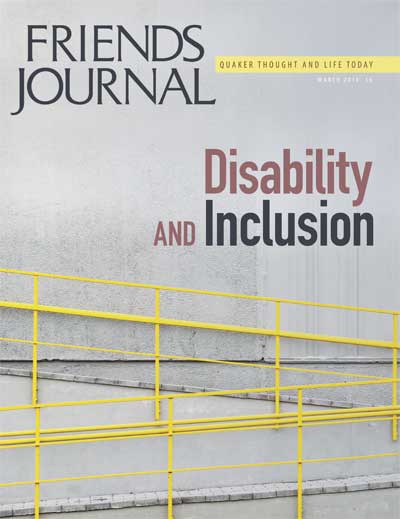
FJ PODCAST SUBSCRIPTION: ITUNES | DOWNLOAD | RSS | STITCHER
We gather in waiting in meeting for worship on Sunday morning, sitting—not standing—for an hour, because it would bother our feet to stand that long. But before we can even gather, we need to enter the meetinghouse, which most of us do by reaching out with an arm, grasping the doorknob with a hand, and turning it, because we are not infrared entities that can transmit through a door. As we open the door, we breathe in and out four or five times, bringing in needed oxygen and clearing out carbon dioxide and waste. Going a bit further back, perhaps before heading into worship, we make a quick visit to the restroom, because our bodies collect and self-rid of fluids. Oh, and yes, we’ve eaten breakfast and had something to drink for energy and hydration. By the time we have entered worship, our embodiment has led us to enact—voluntarily or involuntarily—trillions of little and big subtle actions that very day.
What we are experiencing is corporeal existence: simple, peaceful, with integrity, in community, and bearing equality. Yes, we are spirits, and there is that of Beyond-Matter in everyone, but we all experience life through these bodies of ours. And, because we are corporeal beings, we are constantly accommodating our physical existences in myriad ways, all day long and throughout the night with our embodied need for sleep. So we all accommodate ourselves, and each other, moving around each other in sometimes graceful, sometimes bumbling choreographies.
Our meetings constantly accommodate our corporeal existences as well. There are chairs or benches to sit on. There are lights in the windowless bathrooms for those who rely on eyesight to find the toilet. There are printed or emailed calendars to remind our less-than-computeresque memory banks of what matters in meeting the following week. The meetinghouse is heated in the winter for comfort and to prevent hypothermia. There is food served mid-day if the meeting day is long. These are, in fact, the normal, standard accommodations to embodied beings participating in a meeting. Everyone who enters the meetinghouse has needs that are mundane and expected to be met, even though they cost a pretty penny in total: hence the budget lines for furnishings, electricity, heat, sewer, equipment, printing paper, ink cartridges, office computers, toilet paper, ice melt, and snow shovels. All items are expected, paid-for accommodations to corporeal existence within meetings.
Oh, but then in come people who are thought of as having special needs: vision-impaired or blind folks, wheelchair users, deaf or hard of hearing, Friends on the autism spectrum, with ADHD, psychiatric disabilities, crutch users, to name but a few.
There’s no doubt that accommodating people with disabilities can have an added cost. To incorporate, include, and benefit from the integration of such folks, there would need to be ramps, lifts, elevators, accessible bathrooms, braille, large print, assistive listening devices, noise-attenuating headphones, and more.
But is the accommodation of corporeal beings with identified disabilities really so much more complex, or is it the added budgetary issues that need to be considered? I suggest that it’s the latter.
Indeed, if there is deep and tender understanding about everyone’s need for corporeal accommodation, then the inclusion, integration, and incorporation of people with disabilities is very simple. We start with the realization that we are all embodied.
And we deepen from there to note—to know—that everyone will eventually have a disability: hearing impairment, vision loss, a broken limb or arthritis, and even just trouble breathing in the rattles at end-of-life. Our bodies are temporary and function well only temporarily.
And do we not all know this, even in great fear?
But, truly, if we can know that our meeting and Friends within our meeting share this knowledge as well as the resulting need for accommodation, we can breathe more easily, in unity about our temporariness and in joy while sharing our mutual accommodation. If we know and share, there doesn’t need to be a huge leap of faith to accommodate one another—and ourselves—in the process.



Profound article. Bravo.